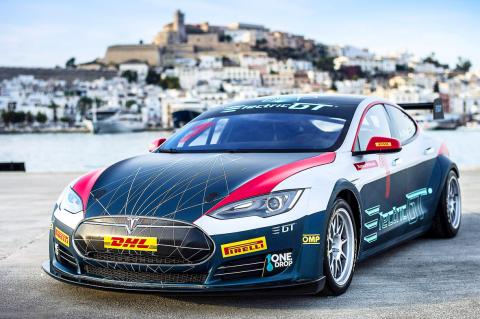After fueling the 20th century automobile culture that reshaped cities and defined modern life, gasoline has had its day.
The International Energy Agency (IEA) forecasts that global gasoline consumption has all but peaked, as more efficient cars and the advent of electric vehicles from new players, such as Tesla Motors Inc, halt demand growth in the next 25 years. That shift is to have profound consequences for the oil-refining industry, because gasoline accounts for one in four barrels consumed worldwide.
“Electric cars are happening,” IEA executive director Fatih Birol said in an interview in London, adding that their number would rise from little more than 1 million last year to more than 150 million by 2040.

Photo: EPA
The cresting of gasoline demand shows how rapidly the oil landscape is changing, casting a shadow over an industry that commonly forecasts decades of growth ahead. Royal Dutch Shell PLC, the world’s second-biggest energy company by market value, shocked rivals this month when a senior executive said overall oil demand could peak in as little as five years.
The IEA does not share Shell’s pessimism. While the agency anticipates a gasoline peak, it still forecasts overall oil demand growing for several decades because of higher consumption of diesel, fuel oil and jet fuel by the shipping, trucking, aviation and petrochemical industries.
For Philip Verleger, president of the consultant PKVerleger LLC in Colorado and a veteran oil market analyst, the IEA’s outlook is one of the more optimistic outcomes for the global industry.
“Refiners across the globe can only hope that this forecast turns out to be right — because all the indications are today that consumption is going to begin dropping not in 2030, but probably in 2020,” Verleger said. “It’s the best news a dying patient can hope to get.”
The projections are part of the analysis the Paris-based IEA did for its World Energy Outlook 2016 flagship report.
The agency forecast that gasoline demand will drop to 22.8 million barrels a day by 2020 from 23 million barrels a day last year. By 2030, consumption is to rebound slightly, reaching a peak of 23.1 million barrels a day, before falling again toward 2040.
The forecast is more pessimistic than the one released a year ago, when the IEA saw robust demand growth from now until 2030.
Gasoline has been the world’s choice to power automobiles. From the 1950s onward, when Henry Ford’s dream that every middle-class American could own a car became reality, gas stations sprung up next to drive-through restaurants and strip malls and transformed the landscape of the US and economies across the globe.
However, now, car companies — most obviously Tesla, but also incumbents such as General Motors Co, BMW AG and Nissan Motor Co — are putting their money, and reputations, behind electric vehicles. With technology improving — especially for batteries — prices are falling. Tax breaks, particularly in China, are helping sales.
Global gasoline demand grew by about 20 percent between 1990 and last year, despite competition from diesel in Europe, where the fuel benefited from tax breaks.
In the next 25 years, gasoline consumption would drop 0.2 percent, according to the new IEA calculations.
While the number of passenger vehicles would double to 2 billion by 2040, “the amount of oil we use for cars will be lower than today,” Birol said.

The Eurovision Song Contest has seen a surge in punter interest at the bookmakers, becoming a major betting event, experts said ahead of last night’s giant glamfest in Basel. “Eurovision has quietly become one of the biggest betting events of the year,” said Tomi Huttunen, senior manager of the Online Computer Finland (OCS) betting and casino platform. Betting sites have long been used to gauge which way voters might be leaning ahead of the world’s biggest televised live music event. However, bookmakers highlight a huge increase in engagement in recent years — and this year in particular. “We’ve already passed 2023’s total activity and

Nvidia Corp CEO Jensen Huang (黃仁勳) today announced that his company has selected "Beitou Shilin" in Taipei for its new Taiwan office, called Nvidia Constellation, putting an end to months of speculation. Industry sources have said that the tech giant has been eyeing the Beitou Shilin Science Park as the site of its new overseas headquarters, and speculated that the new headquarters would be built on two plots of land designated as "T17" and "T18," which span 3.89 hectares in the park. "I think it's time for us to reveal one of the largest products we've ever built," Huang said near the

China yesterday announced anti-dumping duties as high as 74.9 percent on imports of polyoxymethylene (POM) copolymers, a type of engineering plastic, from Taiwan, the US, the EU and Japan. The Chinese Ministry of Commerce’s findings conclude a probe launched in May last year, shortly after the US sharply increased tariffs on Chinese electric vehicles, computer chips and other imports. POM copolymers can partially replace metals such as copper and zinc, and have various applications, including in auto parts, electronics and medical equipment, the Chinese ministry has said. In January, it said initial investigations had determined that dumping was taking place, and implemented preliminary

Intel Corp yesterday reinforced its determination to strengthen its partnerships with Taiwan’s ecosystem partners including original-electronic-manufacturing (OEM) companies such as Hon Hai Precision Industry Co (鴻海精密) and chipmaker United Microelectronics Corp (UMC, 聯電). “Tonight marks a new beginning. We renew our new partnership with Taiwan ecosystem,” Intel new chief executive officer Tan Lip-bu (陳立武) said at a dinner with representatives from the company’s local partners, celebrating the 40th anniversary of the US chip giant’s presence in Taiwan. Tan took the reins at Intel six weeks ago aiming to reform the chipmaker and revive its past glory. This is the first time Tan